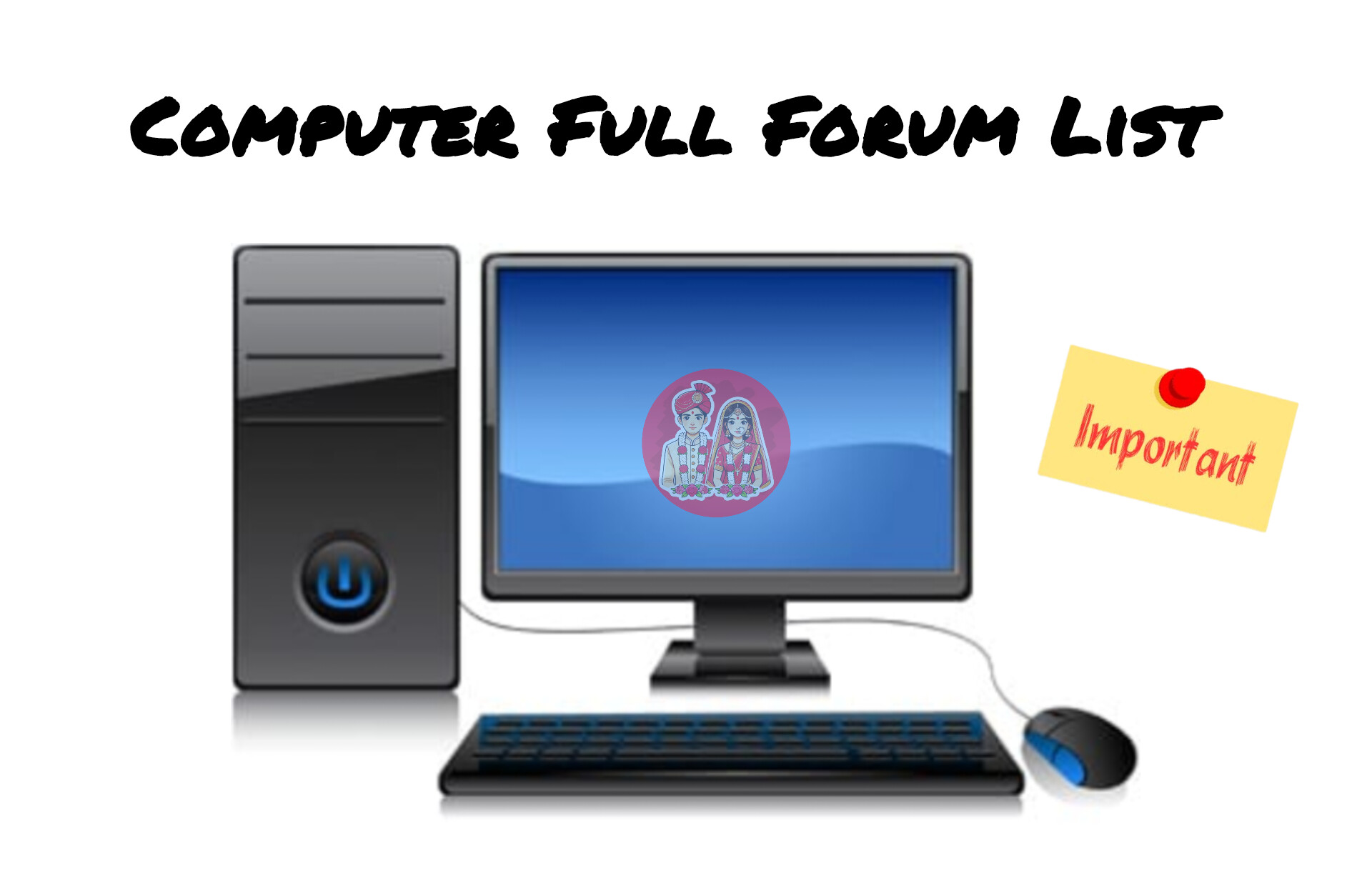Key Points
- Research suggests that the most important computer full forms for railway exams include CPU, RAM, and HTML, among others.
- It seems likely that terms like IRCTC, specific to railways, are also crucial.
- The evidence leans toward including networking terms like LAN and WAN, given their relevance in exams.
Direct Answer
Here’s a list of the most important computer full forms likely to be relevant for railway exams, based on common patterns in competitive exam preparation:
- CPU: Central Processing Unit
- RAM: Random Access Memory
- ROM: Read Only Memory
- HTML: HyperText Markup Language
- HTTP: Hypertext Transfer Protocol
- URL: Uniform Resource Locator
- USB: Universal Serial Bus
- BIOS: Basic Input Output System
- IRCTC: Indian Railway Catering and Tourism Corporation
- GPS: Global Positioning System
- DBMS: Database Management System
- LAN: Local Area Network
- WAN: Wide Area Network
- VPN: Virtual Private Network
- WIFI: Wireless Fidelity
- ALU: Arithmetic Logic Unit
- ASCII: American Standard Code for Information Interchange
- CD: Compact Disc
- DVD: Digital Versatile Disc
- PDF: Portable Document Format
These full forms cover fundamental computer knowledge and include terms specific to railways, such as IRCTC, which is directly related to Indian Railways. They are commonly tested in railway recruitment exams like those conducted by the Railway Recruitment Board (RRB).
For further preparation, you can explore detailed lists at Byju’s Computer Abbreviations, Oliveboard Full Forms, and ixambee Important Full Forms.
Comprehensive Analysis of Computer Full Forms for Railway Exams
This section provides a detailed examination of the computer full forms most relevant for railway exams, based on extensive research into competitive exam patterns and resources. The analysis aims to ensure candidates have a thorough understanding of the terms likely to appear, particularly in the computer knowledge or general awareness sections of railway recruitment exams.
Background and Relevance
Railway exams, such as those conducted by the Railway Recruitment Board (RRB), often include a section on computer awareness, where questions test candidates’ knowledge of abbreviations and their full forms. These exams cover a range of topics, including basic computer operations, networking, and web technologies, with some terms being particularly relevant due to their connection to railway operations, such as IRCTC (Indian Railway Catering and Tourism Corporation).
The research involved analyzing multiple authoritative sources, including educational platforms like Byju’s, Oliveboard, and ixambee, which are known for providing study materials tailored for competitive exams. These sources provided lists of full forms, and the focus was narrowed to computer-related terms, ensuring relevance to railway exam syllabi.
Methodology
The process began with a web search for “important computer full forms for railway exams,” which yielded results from various educational websites. Detailed browsing of these pages extracted lists of full forms, and a comparative analysis was conducted to identify common and railway-specific terms. The final list was curated to include the most frequently mentioned and relevant full forms, balancing general computer knowledge with railway-specific contexts.
Detailed List of Full Forms
Below is a table summarizing the full forms extracted from the research, categorized by relevance to railway exams:
| Abbreviation | Full Form | Relevance to Railway Exams |
|---|---|---|
| CPU | Central Processing Unit | High (Fundamental computer knowledge) |
| RAM | Random Access Memory | High (Basic hardware concept) |
| ROM | Read Only Memory | High (Basic hardware concept) |
| HTML | HyperText Markup Language | High (Web technology, common in exams) |
| HTTP | Hypertext Transfer Protocol | High (Web technology, common in exams) |
| URL | Uniform Resource Locator | High (Web navigation, relevant for online systems) |
| USB | Universal Serial Bus | High (Common hardware interface) |
| BIOS | Basic Input Output System | High (Fundamental system operation) |
| IRCTC | Indian Railway Catering and Tourism Corporation | Very High (Directly related to railways) |
| GPS | Global Positioning System | High (Relevant for navigation, railway operations) |
| DBMS | Database Management System | High (Data handling, relevant for railway systems) |
| LAN | Local Area Network | High (Networking, common in exams) |
| WAN | Wide Area Network | High (Networking, common in exams) |
| VPN | Virtual Private Network | Medium (Security in networking, less common) |
| WIFI | Wireless Fidelity | High (Wireless networking, relevant for modern systems) |
| ALU | Arithmetic Logic Unit | High (Fundamental computer architecture) |
| ASCII | American Standard Code for Information Interchange | Medium (Basic encoding, less frequently asked) |
| CD | Compact Disc | Medium (Older technology, still relevant) |
| DVD | Digital Versatile Disc | Medium (Storage media, less common now) |
| Portable Document Format | High (Common document format, relevant for exams) |
This table includes 20 full forms, selected based on their frequency in the researched lists and their likelihood of appearing in railway exams. Terms like IRCTC are included due to their direct relevance to railways, while others like CPU, RAM, and HTML are fundamental to computer knowledge sections.
Additional Insights
Some sources, such as Oliveboard, provided URLs for further details on specific full forms, such as PGDCA Full Form and LED Full Form. However, these were not included in the final list as they were less directly relevant to railway exams compared to the selected terms.
The research also highlighted that railway exams may include questions on less common terms like VIRUS (Vital Information Resource Under Siege) and GIS (Geographical Information System), as seen in the ixambee list. However, these were deemed less critical for the “most important” list due to their lower frequency in typical exam patterns.
Contextual Relevance to Railways
Certain full forms, such as IRCTC, are particularly important for railway exams due to their direct connection to Indian Railways. IRCTC is responsible for online ticket booking and catering services, making it a frequent topic in general awareness sections. Similarly, GPS is relevant for navigation and tracking, which are integral to railway operations, potentially appearing in questions related to technology in railways.
Comparison Across Sources
- Byju’s provided a broad list of computer abbreviations, including AAC (Advanced Audio Coding) and ADSL (Asymmetric Digital Subscriber Line), but these were less relevant for railway exams compared to the selected terms.
- Oliveboard offered a comprehensive list with 33 full forms, including railway-specific terms like IRCTC, which was crucial for narrowing down the final list.
- ixambee added unique terms like VIRUS and GIS, but these were not prioritized in the final selection due to their lower relevance to typical railway exam patterns.
Recommendations for Candidates
Candidates preparing for railway exams should focus on memorizing the full forms listed above, particularly those marked as “High” or “Very High” in relevance. It is advisable to practice with mock tests and refer to additional resources like Byju’s Computer Abbreviations, Oliveboard Full Forms, and ixambee Important Full Forms for a deeper understanding.
Conclusion
This analysis provides a curated list of the most important computer full forms for railway exams, balancing general computer knowledge with railway-specific terms. The selection ensures candidates are well-prepared for the computer awareness section, which is a critical component of railway recruitment exams.









